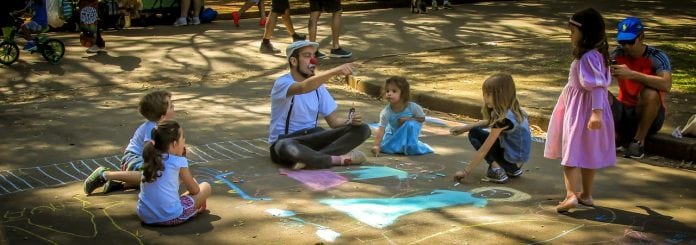
Overweight children. Urban isolation. Neighbours who’ve never spoken to each other.
Have you ever heard your child saying something like: ‘There’s always lots of my friends outside and you can bring your own toys. I do quite a lot of chatting and sometimes I use chalk and do drawings on the road.’
It sounds a little bit unreal, especially if you live in Dubai where the play areas are somewhat limited to parks. But parents can choose how their children play outside. They can unite in their neighbourhoods to slow traffic through the residential streets so their children can come out and play for an hour or two. Such initiatives will bring both them and their children into contact with people around them they’d otherwise never have known.
There’s something quite exciting about seeing different cultures play in different ways, and seeing the universality of it. You can meet so many people, especially those whose kids aren’t school age yet. It will help make a really strong sense of community, and a lot more people walking around the neighbourhood.
Children today don’t run around town. And everyone’s back gardens are fenced off, you can’t run between them like you did when you were a child. The idea of children playing in the street is easy to spread.
If parents form groups, they can request street closures to be organised for a few hours weekly, monthly or quarterly. Especially within the gated residential communities, this is not going to be a challenge.
It’s improbable that a child would ever go more than, at most, once a week. How much difference can that really make? If it’s just that one play session, it’s still significant. Even if it’s once a week, you’re getting up to 10% of a weekly “dose” of play.
Parents are more willing to let their kids play out or make little trips even when the road closures aren’t happening. Even very modest improvements in the way how children play outside can have a big benefit if they’re sustained.
If it’s part of something that encourages them to get off their iPads and go outside. It’s socialising and doing something that isn’t just staring at screen, an opportunity to interact with children they may not know very well already.
Street play is not a cure for childhood obesity – not least because it doesn’t address the children’s diet. Although street play sessions lead to an increase in physical activity, which should be beneficial, there’s no direct research comparing participation in the scheme with overall health benefits. But while those benefits cannot be precisely defined, the costs are essentially zero.
Street closures may not work at all for big housing projects, where there aren’t obvious roads to close off and where reports find that residents lack ‘social capital’ – social networks with the confidence that they can change their environment.
Whatever the limitations, the children will love it. Children will just come out onto the street to play. They will bring their toys or their scooters, their roller-blades. They will meet other children for the first time. They don’t need to be told to do anything. It’s a little bit like when you’re on holiday, it’s amazing how quickly children can make friends.




































